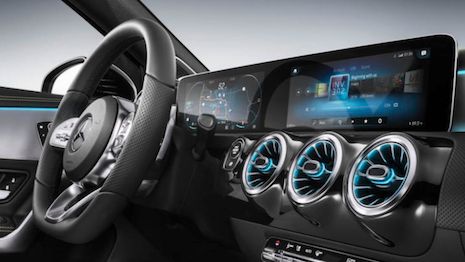- About
- Subscribe Now
- New York,
June 5, 2018

 Mercedes-Benz, Audi and Volvo are the first cars to use Alibaba's AI + Car. Image credit: Alibaba
Mercedes-Benz, Audi and Volvo are the first cars to use Alibaba's AI + Car. Image credit: Alibaba
Female and urban drivers are growing segments in China’s luxury vehicle market, which are pushing the industry to grow 5.4 percent in the next eight years.
Frost & Sullivan’s "China Luxury Car Market, Forecast to 2025" found that 10 percent of 24 million passenger vehicles sold in China last year were luxury models. In China, compact SUVs and C-compact sedans were the most popular models of luxury automobiles.
"Compact SUV and C-Compact sedan are the most preferred luxury car segments in China. Increasing adoption by female and urban drivers, as well as the price conscious, will drive the demand for luxury cars from individual customers over the long term," said Ming Lin Chan, senior research analyst of APAC mobility practice at Frost & Sullivan.
Automotive advancement
Chinese women are now looking for investments and vehicles that reflect their success within their careers, which is pushing the luxury segment forward.
Drivers born in the 1990s and 2000s in China are also likely to drive the luxury auto sector as well. As they all come of age and are allowed to operate a vehicle, they are likely to look for one that will elevate their social status.
Mercedes is one of the German automakers popular in China. Image credit: Mercedes
Frost & Sullivan encourages luxury automakers to reposition their branding to include China and cater to affluent individuals who are likely to respond to a positive custom experience.
Augmented reality and holographic projections are two of many strategies and themes brands can use to integrate themselves into the Chinese market.
The report predicts that the luxury segment will dominate more than 60 percent of market share by the year 2025.
This is extremely important, as China is by far the largest auto segment worldwide.
Mercedes, Audi and BMW are the most popular luxury passenger vehicles in China, with a combined 68.8 percent of market share across SUVs and sedans last year. European automotive original equipment manufacturers lead the luxury car market in China.
Plug-in hybrids and battery-operated electric vehicles are expected to gain greater traction in the market thanks to Tesla and government encouragement. However, gas powertrain cars are expected to remain strong in China's luxury segment over the long-term.
Apple CarPlay remains popular in China. Image credit: Apple
Technologies such as automation and smartphone connectivity are big drivers for the Chinese segment. Apple CarPlay is the most popular form of infotainment-connected service, while Android Auto is prohibited in China.
Additional insight
Luxury automakers should be leading the way in innovation, especially with digital, but a report from L2 shows that mass-market auto brands are driving laps around high-end manufacturers.
L2's Digital IQ Index for the auto industry revealed that Rolls-Royce, Land Rover and Aston Martin are among the few automakers whose mobile sites lack any investment, with load times more than five seconds long. Mercedes was the only luxury brand listed within the top five rankings for digital offerings (see more).
Almost half of the automotive sales growth in China this year has come from luxury brands, driven by consumers’ increasing household wealth and consumer confidence.
According to a report from Scotiabank, in March global automotive sales were up 1.2 percent over the previous year, with China one of the key forces behind this growth. As the Asian market becomes increasingly important to luxury auto brands, OEMs are set to benefit from newly eased regulations in China (see more).
"Luxury automotive brands are adopting cutting-edge technologies such as augmented reality and holographic projections to ensure high brand engagement," Mr. Chan said.
Share your thoughts. Click here